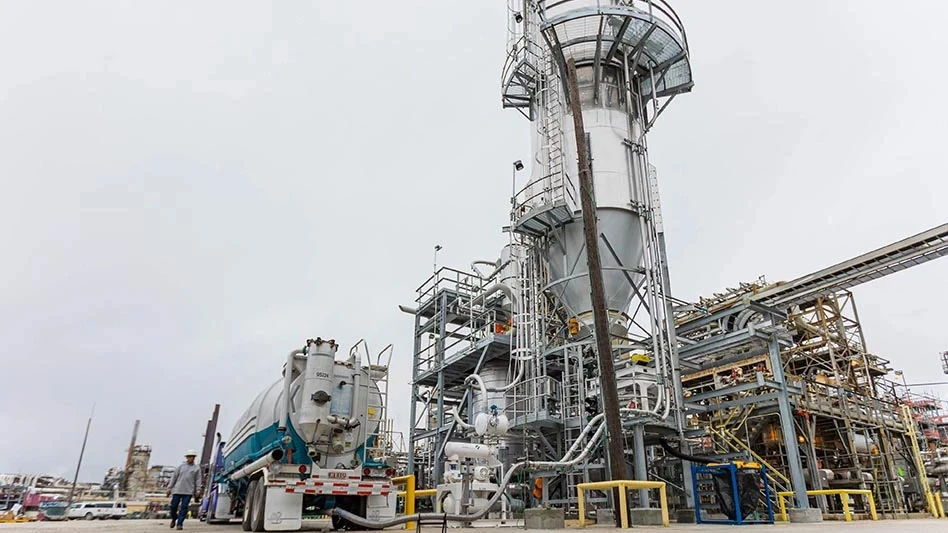
Photo courtesy of ExxonMobil
Global petrochemical company ExxonMobil plans to invest more than $200 million to expand chemical recycling operations at its sites in Baytown and Beaumont, Texas.
The additional capacity is expected to come online in 2026, with the company planning to build additional units to reach a global plastic recycling capacity of 500,000 tons per year by 2027.
“We are solutions providers, and this multimillion-dollar investment will enhance our ability to convert hard-to-recycle plastics into raw materials that produce valuable new products,” says Karen McKee, president of ExxonMobil Product Solutions.
The technology deployed in Baytown works at scale, which McKee says has given ExxonMobil confidence to expand its capacity toward the global 500,000 tons of plastic scrap per year mark.
“We’re proud of this proprietary technology and the role it can play in helping establish a circular economy for plastics and reducing plastic waste,” she says.
The company says its planned investment will add 175,000 tons per year of chemical recycling capacity at Baytown and Beaumont combined, bringing ExxonMobil’s total capacity to 250,000 tons per year.
ExxonMobil says it is continuing to develop additional chemical recycling projects at its refining and manufacturing sites in North America, Europe and Asia as its works toward its goal of 500,000 tons of scrap consumed globally by 2027.
The company has customers for its end products in more than 15 countries in multiple sectors, including food-contact packaging and pet food, and notes that demand is increasing.
According to ExxonMobil, its Exxtend pyrolysis-based chemical recycling technology complements traditional, mechanical recycling by transforming plastic scrap into raw materials that can be used to make many valuable products—from fuels to lubricants to high-performance chemicals and plastics.
The company says its methodology can address a broader range of discarded plastic that may not always be mechanically recycled.
Its first Baytown facility started up in 2022 and now represents one of the largest chemical recycling facilities in North America, having processed more than 35,000 tons of plastic scrap as of last month.
On the supply side, ExxonMobil is part of a joint venture formed in 2021 with New Hampshire-based Cyclyx intended to improve the collection and sortation of plastic scrap.
The effort involving both ExxonMobil and Cyclyx comprised a portion of an investigative report that questioned to what extent the two companies were meeting their targets to convert mixed, discarded plastic into new products via pyrolysis technology. Pyrolysis as a chemical recycling technique has, likewise, been the subject of scrutiny.
Latest from Recycling Today
- BMW Group, Encory launch 'direct recycling’ of batteries
- Loom Carbon, RTI International partner to scale textile recycling technology
- Goodwill Industries of West Michigan, American Glass Mosaics partner to divert glass from landfill
- CARI forms federal advocacy partnership
- Monthly packaging papers shipments down in November
- STEEL Act aims to enhance trade enforcement to prevent dumping of steel in the US
- San Francisco schools introduce compostable lunch trays
- Aduro graduates from Shell GameChanger program





